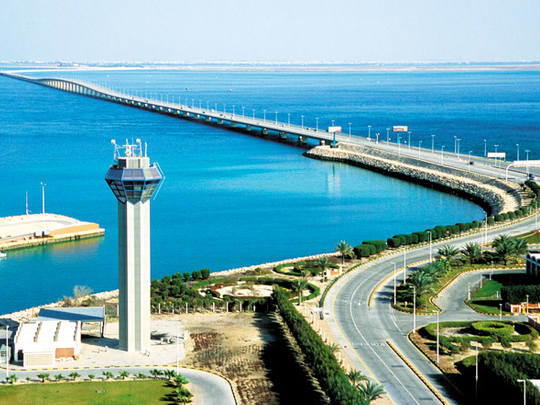
Whilst press reports continue speculating on a possible new political structure defining ties between Saudi Arabia and Bahrain, facts on the ground confirm ever- stronger economic ties between the two neighbours. The drive for stronger political ties between Riyadh and Manama is taking place in the context of the push for political union among the six-nation Gulf Cooperation Council (GCC). This issue is likely to remain a key foreign policy objective as Manama prepares to host the 33rd GCC summit by the end of this year.
Oil revenues
Already Saudi Arabia is Bahrain's main trading partner with oil playing a key role. Saudi Arabia and Bahrain share the output of 300,000 barrels per day of the offshore Abu Saafa field. Proceeds generated by the Abu Saafa field contribute more than half of total oil revenues for Bahrain, in turn the primary source of treasury income. In addition, Bahrain's sole refinery largely depends on crude oil imported from Saudi Arabia via an undersea pipeline. Bahrain pays prevailing market prices for imported Saudi crude oil, with no discounts offered.
Examples of other growing economic relationships include that of Saudi authorities allowing Gulf Air to offer air links in the vast kingdom to cities normally not served by international carriers. Another instance is the decision by Prince Al Waleed Bin Talal to select Bahrain as a base for a new television channel.
Plans are under way for Gulf Air to further expand into the Saudi market to partly make up for lost business in Iran and Iraq. The government of Bahrain, which fully owns Gulf Air, forced the carrier last year to indefinitely suspend its operations to Iran and Iraq.
The decision reflects displeasure by Bahrain's authorities of political positions undertaken by both Tehran and Baghdad vis-a-vis events in Bahrain. It may be recalled that in mid-February last year, Bahrain faced popular demands calling for partnership in making public choices and decisions.
Specific demands included guaranteeing a popular say in formation of the cabinet possibly through parliamentary results, ensuring fair electoral districts and showing no tolerance towards discrimination.
At any rate, Saudi Arabia is a key regional market for Gulf Air, second only to the UAE.
New scheme
A new scheme by Gulf Air calls for commencing flights in the first half of this year to three more Saudi cities, namely Ghassim, Taif and Yanbu, bringing the number of cities served by Gulf Air to seven.
Currently, Gulf Air serves Riyadh, Jeddah, Madinah and Dammam. According to a report by the Centre for Aviation and Innovation (Capa), services to the three cities would raise the number of flights to destinations in Saudi Arabia to 70 per week.
This further places Gulf Air ahead of regional rivals Emirates, Etihad and Qatar Airways with regard to flights to Saudi Arabia.
Judged by economic statistics, expansion into the Saudi market has its benefits. At $577 billion (Dh2.11 trillion), the gross domestic product of Saudi Arabia is by far the largest in the Arab world. Comparatively, Bahrain boasts a GDP of $21 billion, merely 4 per cent the size of the Saudi economy.
Timely lifeline
Gulf Air sustained financial losses of $500 million in 2010. a hefty 7 per cent of total government spending for the year. Certainly, easing of restrictions in the Saudi market offers a new lifeline for the carrier.
Separately, the imminent launch of Alarab TV from Bahrain should enhance the country's economic fortunes.
The project received a fresh boost earlier in the month marking the inauguration of Manama as a capital of Arab culture for 2012.
The developments could not be more timely given the notable departure of some financial institutions due to political uncertainty one year on since events in mid-February last year.
The writer is a Member of Parliament in Bahrain.












